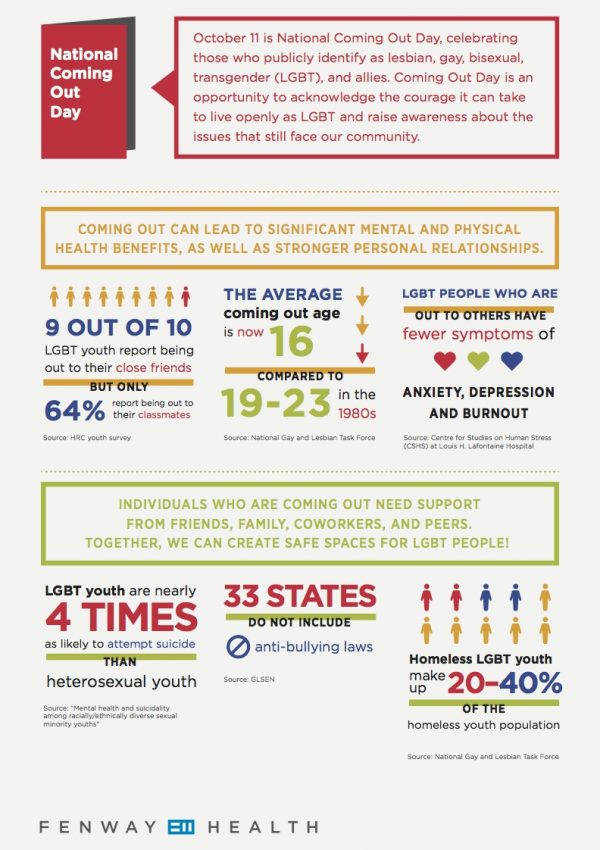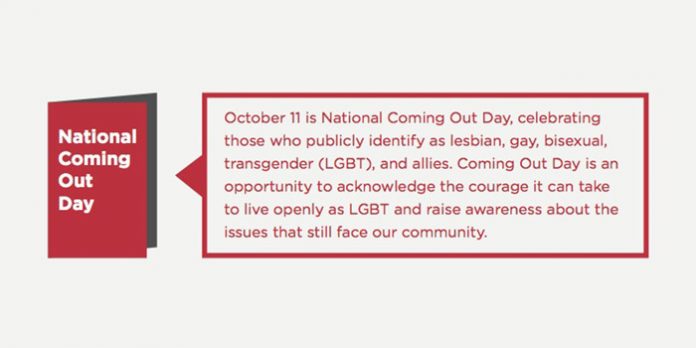 This Saturday, October 11, marks the 16th annual National Coming Out Day. Sharing an anniversary with the National March on Washington for Lesbian and Gay Rights, National Coming Out Day is a time to celebrate the courage of openly LGBT individuals, and to raise awareness of the progress made and struggles still faced by the LGBT community.
This Saturday, October 11, marks the 16th annual National Coming Out Day. Sharing an anniversary with the National March on Washington for Lesbian and Gay Rights, National Coming Out Day is a time to celebrate the courage of openly LGBT individuals, and to raise awareness of the progress made and struggles still faced by the LGBT community.
At Fenway Health, we recognize that coming out is an extremely personal decision, and that the path through the closet door is unique to each person’s story. While individual experiences are as varied as the people within our communities, research suggests that one universal truth holds true: Coming out is good for your health.
Living in the closet can take an emotional and physical toll, decreasing quality of life and general wellbeing personally and professionally. According to the Centre for Studies on Human Stress (CSHS) at Louis H. Lafontaine Hospital, LGBT individuals who are out to friends and family have lower stress hormone levels and display fewer symptoms of depression, anxiety, and burnout.
Robert-Paul Juster, lead author of the Centre’s study, minced no words when he discussed the correlation between living openly and living well. “Coming out is no longer a matter of popular debate, but a matter of public health,” he said.
When it comes to the workplace, several studies have found that LGBT people who are not out at work are more fearful and distrustful of management, are less committed to their job, and are less likely to try for promotions or wage increases. This failure to thrive professionally only perpetuates the cycle of poverty experienced by many in the LGBT community.
Familial support can also make a huge health impact on individuals coming out of the closet. A study by the Boston University School of Public Health found that LGBT adults whose parents provided positive support during the coming out process are significantly less likely to struggle with mental health and substance abuse problems.
For LGBT youth, coming out at school can lead to closer friendships and improved self-confidence, which it turns fosters a healthier learning environment. Researchers at the University of Rochester found that students who were out to their peers reported less anger about their lives and greater self-esteem among their friends than students who were not out.
Despite the significant strides made for LGBT rights in recent years, coming out remains a difficult and sometimes painful experience for many people. Friends, family, coworkers, and neighbors of LGBT people can make a huge impact on their health and wellbeing by remaining supportive and understanding during the coming out process. There are many resources available for those coming out, as well as for their loved ones. Our behavioral health team is also always available to provide coming out support, both in individual and group sessions. For more information on our services, please call 617.927.6202.
The Fenway Health community wishes you and yours a very happy – and healthy – National Coming Out Day!
Want to receive email updates about what’s happening at Fenway Health? Sign up here.









